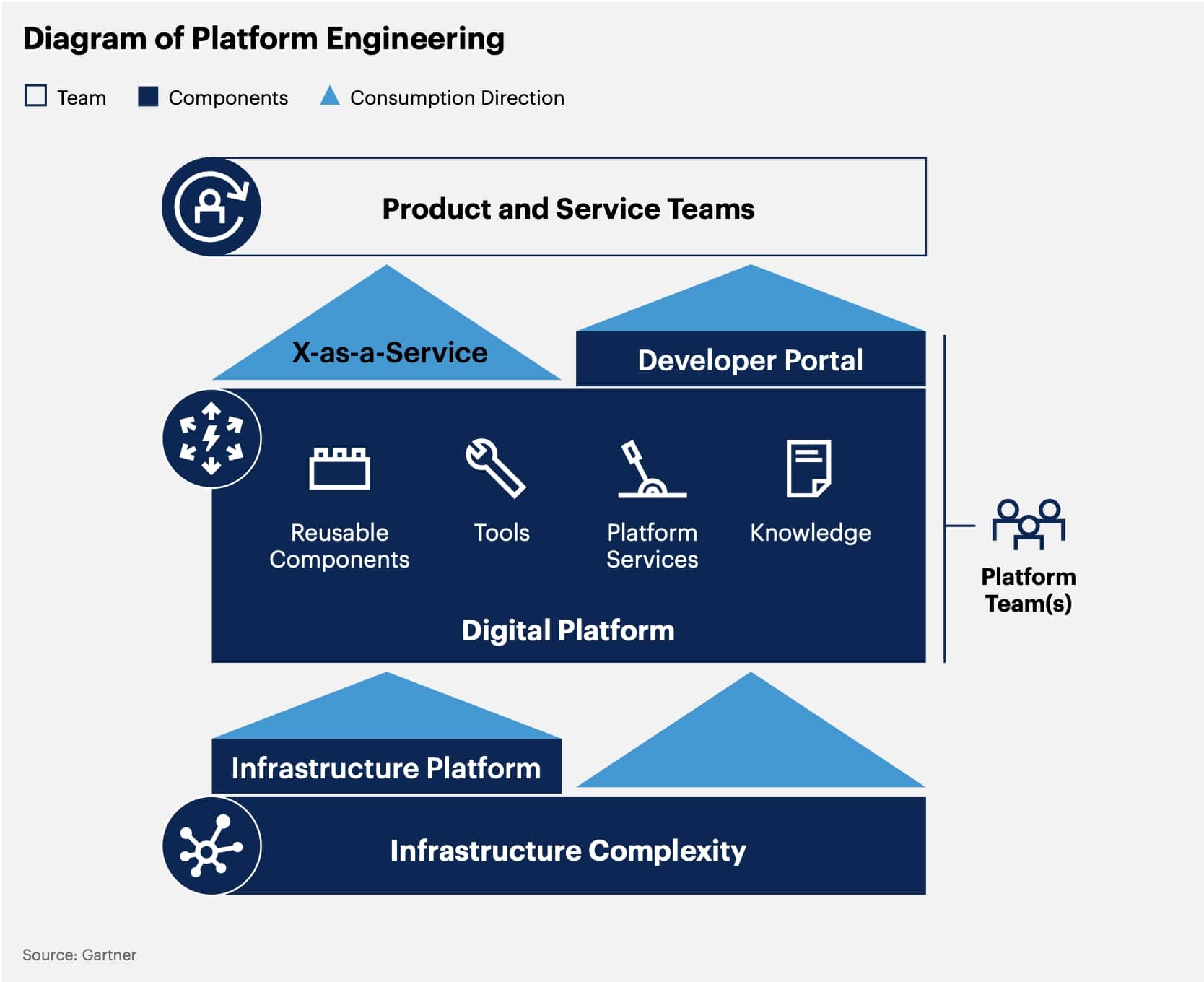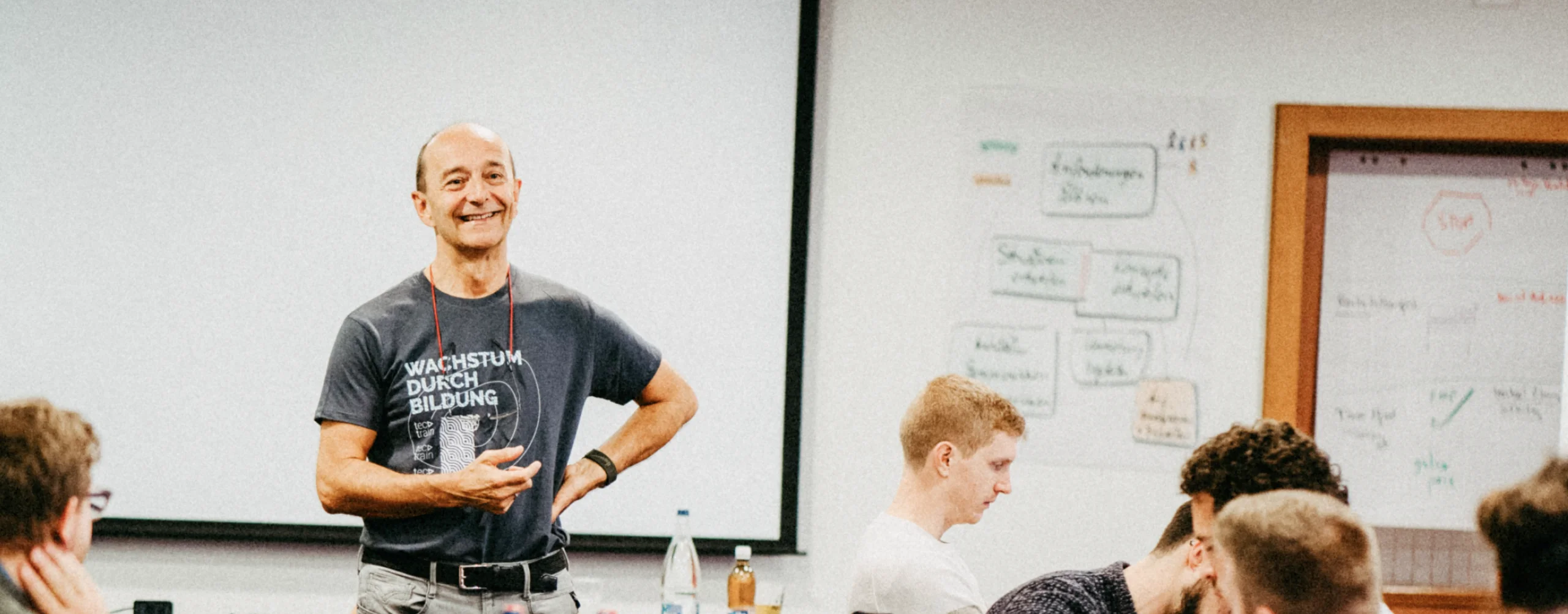Key Takeaways
-
What's Platform Engineering All About? Think of platform engineering as the new kid on the tech block. It's all about crafting and managing those complex software platforms that are the backbone of today's digital services. It's like building bridges between users and the complex services they rely on, making life easier for developers and speeding up how fast we get cool apps.
-
Platform Engineering vs. DevOps - What's the Difference? If DevOps was about getting development and operations teams to play nice together, platform engineering takes it a step further. It's like DevOps on steroids, focusing on the whole tech stack, making things more standardized and efficient, and giving developers the tools they need without the hassle.
-
Platform Engineer vs. Software Engineer - Same Thing? Not quite. While software engineers focus on, well, software, platform engineers are the ones who set the stage for the show. They handle the behind-the-scenes stuff - the platforms and infrastructure that make sure the software runs smoothly.
-
The Future of Platform Engineering - What's Next? The world of platform engineering is moving fast, gearing up for a future where things like AI, machine learning, and cloud computing are the norm. It's all about making tech ecosystems more flexible, scalable, and efficient.
-
From DevOps to Platform Engineering - The Evolution Story: Platform engineering is like the next chapter in the DevOps story. It's about tackling the growing complexity of software in our cloud-driven world, focusing on creating platforms that make software development and deployment a breeze.
What is Platform Engineering?
We're seeing and using the concept of platform engineering more and more. Technology is evolving every day, every minute, and every second. This evolution leads to the creation of entirely new concepts, work areas, and job sectors; platform engineering is one of these emerging concepts. So, what brings platform engineering to the forefront and makes it so impactful?
At its core, platform engineering involves designing, building, and managing complex software platforms. These platforms are the backbone of many modern digital services, supporting everything from cloud computing to large-scale data processing.
As specified in 2024 Gartner Top 10 Strategic Technology Trends, experts predict that as technology evolves, the demand for skilled platform engineers will rapidly increase, making it a key trend to watch in the tech world.
When we look at Garter's Top Strategic Technology Trends 2024 report, Gartner predicts that;
By 2026, 80% of software engineering organizations will establish platform teams as internal providers of reusable services, components, and tools for application delivery.
So what is this platform engineering and why has it become such a trend?
Role, Principles & Benefits
Platform engineering is emerging as a discipline that will respond to the increasing complexity of modern architectures, especially in the cloud-based era. It acts as a bridge between end users and complex services by designing and building toolchains and workflow that enable self-service capabilities for software engineering organizations.

The role of platform engineers:
-
Treating the platform as a product
-
Building and maintaining an engineering platform with a dedicated product team
-
Supporting software developers' needs with common, reusable tools
-
Interfacing with complex infrastructure
-
Optimizing developer experience
-
Speeding up the delivery of applications
-
Increasing business value
-
Accelerating the delivery of customer value
A dedicated product team builds and maintains the engineering platform designed to support the needs of software developers and others designing for complex infrastructure by providing common, reusable tools and capabilities.
The specific capability of an engineering platform depends entirely on the needs and requirements of its end users. Platform units must understand the needs of user groups, increase the visibility of work, and then create a platform that is useful to the target audience.
Platform Engineering vs DevOps
DevOps Evolution and the Rise of Platform Engineering
We can say that DevOps emerged from efforts to improve more traditional approaches such as waterfalling in the software development process. Although it was a long time ago, it is remembered that in the waterfall approach, a phase of software development could only continue when the previous phase was completed.
When we compare the waterfall approach with DevOps, it is an obvious fact that waterfall is an approach that slows down the development process, does not leave the opportunity for teams to pivot, and pushes the testing phase to a later stage. From this perspective, thanks to the innovative approach it brings, DevOps is a revolutionary development in the way teams design, create and deliver software.
DevOps brings together the people who create software and those who keep it running, making them work as one team. This way, everyone talks and works together better, breaking down old walls that used to keep them apart. This new teamwork has made it easier and faster to make and update software, helping businesses keep up with fast changes.
Now, we're seeing that we need to go even further to handle the bigger challenges of working with cloud technology. According to DevOps.com,
The rise of the platform engineer means a shift towards greater scalability, flexibility, and efficiency in managing modern technology ecosystems. It is about leveraging technology to its fullest and creating a platform that is more than the sum of its parts.
What is platform engineering vs DevOps?
Let's think about platform engineering and DevOps are sharply separated concepts, or can we define platform engineering as an upper version of DevOps?
We are all sure that DevOps and platform engineering are both critical in the modern software development landscape. But how do they differ in their approaches, focus areas, and methodologies? We must answer this question to understand how each differentiates our perspective towards the software development process.
Comparing Approaches
🔵 DevOps Approach:
-
Bringing Teams Together: DevOps is like a team-building exercise for developers and operations folks. It's all about getting these two groups to work hand-in-hand, automating everything from coding to deployment.
-
Breaking Down Walls: Imagine DevOps as a big, friendly gathering where everyone talks, shares, and solves problems together. It's about smashing those old workplace silos and fostering a culture where everyone collaborates.
-
Staying Agile and Quick: DevOps is like being a software ninja, always ready to adapt and change at a moment's notice. It's about keeping things moving and constantly improving.
🟢 Platform Engineering Approach:
-
Blueprints for Success: Think of Platform Engineering as the architect of the tech world. It uses Infrastructure as Code (IaC) to build solid, error-free foundations for software development.
-
DIY for Developers: It's all about giving developers the tools to help themselves, like a high-tech version of a self-service checkout. This way, they can get what they need without waiting.
-
Order and Rules: Platform Engineering is the rule-maker, setting up standards and guidelines to make sure everything runs smoothly and safely.
Contrasting Focus Areas
🔵 DevOps Focus:
-
Streamlining the Workflow: DevOps is obsessed with making things faster and smoother, focusing on continuous integration and delivery to speed up the whole software lifecycle.
-
Efficiency is Key: It's all about cutting down the time from idea to deployment, making the process as lean and quick as possible.
-
Teamwork Makes the Dream Work: DevOps puts a big emphasis on everyone working together seamlessly.
🟢 Platform Engineering Focus:
-
Building the Toolbox: Platform Engineering is like a master craftsman, creating and managing the tools and platforms everyone else uses to build software.
-
Keeping the Foundation Strong: It's all about the infrastructure, the nuts and bolts that keep the whole software development world running smoothly.
Analyzing Methodologies Side by Side
🔵 DevOps Methodology:
-
Integration and Collaboration: DevOps works smoothly, bringing together different tools and ways of working to make sure everyone works well together.
-
Continuous Updates: It's all about keeping the software fresh and up-to-date with continuous integration and delivery.
-
Fast and Reliable: DevOps aims to deliver software quickly and without hiccups.
🟢 Platform Engineering Methodologies:
-
Making the Details Easy: Platform Engineering is all about making life easier by automating the complex bits, especially the infrastructure part.
-
Empowering the Creators: It's focused on giving developers the power to create without getting bogged down in operational details.
Key differences and similarities
Platform engineering is an advanced discipline that extends beyond traditional DevOps by encompassing a wider range of skills and responsibilities. It focuses on creating efficient, self-service infrastructures and evolving DevOps methodologies to meet the complex demands of modern software development and deployment.
Consequently, the role of a platform engineer isn't to replace DevOps but to evolve from it, expanding the principles that made DevOps so successful to meet the challenges and opportunities of the new technology era.
The Future of Platform Engineering
According to Garter's Top Strategic Technology Trends 2024 report and the information in the Google Clouds Accelerate State of DevOps Report, as the definition and role of DevOps continue to evolve, we see that platform engineering is beginning to shape the future of software development and operations. The latest buzz around platform engineering is really shining a light on methods like using containers, smart AI and learning systems, serverless computing, and all that cloud magic.
The Humanitec DevOps Benchmarking Study from 2023 tells us that platform engineering isn't just a fancy term—it's actually pushing the boundaries of what's possible, especially when things are up in the air. By giving developers their own platforms, it's making their work life a whole lot easier, cutting down on the brain drain, and letting them handle things on their own. This isn't just good for their peace of mind; it's great for business too. It means getting products out the door faster, opening up new ways to make money, keeping things secure, and even saving on cloud bills.
When we finalize all research and studies, there are some predictions for the future of platform engineering;
-
Rapid development from idea to functioning software, embodying continuous improvement
-
The natural progression from DevOps to platform engineering, highlighting the importance of platform-centric approaches like containerization, AI and machine learning, serverless computing, and cloud-native technologies.
-
A high rate of DevOps culture adoption in organizations, underlining its growing influence.
-
Platform engineering familiarity indicates a need for more awareness and education in platform engineering, despite its growing adoption.
-
Impact of Platform Engineering: Reports improvements in standardization and faster product delivery among organizations adopting platform engineering.
-
It is predicted the future of DevOps and platform engineering to be influenced by GitOps, AI and Machine Learning, DevSecOps, developer platforms, and serverless computing.
Conclusion
2023 reports published by different institutions and organizations indicate that platform engineering will develop and become an increasing trend. The cool thing about tech getting better is that it helps users and software developers talk to each other more easily. This means they can work together to come up with stronger solutions faster. By evaluating the concept of platform engineering in this context, we can evaluate it as a need solver that will shape the future.
Each company needs to create a platform system for its own needs, because the platform used for one company may not have the same effect for another company or even for different product groups within the company. The main goal in platform engineering is to be consistent and efficient.
On this point, teams may use the software delivery and operational performance measures as signals to monitor whether platform efforts are helping teams achieve better results.






.jpg)

